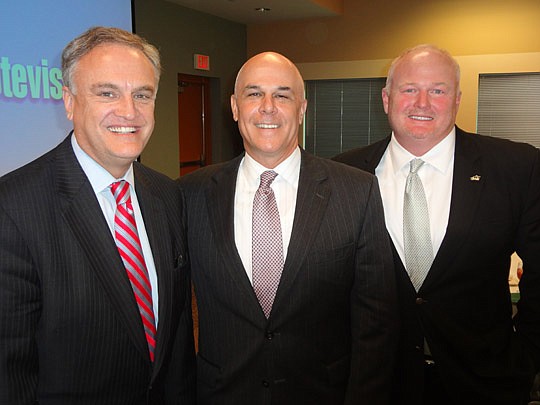
One question about Tuesday’s presidential election is whether Republican nominee Mitt Romney would — or could — repeal President Barack Obama’s Affordable Care Act, which revamps coverage and access for citizens.
Two local health care industry executives said Tuesday that Romney, if elected, could repeal portions of the law but that it will largely remain as passed.
“He’s got to fulfill the commitment made that he changes this thing, but he can’t repeal the entire law unless you see 60-plus votes in the (U.S.) Senate, and that’s just not going to happen,” said Hugh Greene, Baptist Health CEO.
Patrick Geraghty, Florida Blue chairman and CEO, also said it was unlikely the Senate would have the more than 60 votes needed to repeal the act.
But he said Romney, through the reconciliation process, could defund and scale back portions of the law that could “change the very nature” of health care exchanges.
The federal budget reconciliation process is a Senate legislative device to end a filibuster, close debate and pass controversial budget bills, circumventing the three-fifths rule. Reconciliation only requires a simple majority, so it is used by the majority party.
Health care exchanges are intended to make buying health coverage easier and more affordable for individuals and small businesses, according to healthcare.gov.
Both CEOs talked about health care issues Tuesday to about 50 members and guests of The Economic Roundtable of Jacksonville during its “Impact of Health Reform on the First Coast” discussion at Jacksonville University.
“I don’t think it’s going away,” Greene said of the act.
Though the law provides for increased access to individuals and helps close the gap for those without coverage, each CEO said the costs associated with implementing the program still needed work.
Greene talked about how the law affects delivery system reform, which is the most complex part of reform because it affects providers more than consumers.
He said the transformation is to change the system from one of volume to one of quality. How hospitals and providers are reimbursed will depend on the quality of service provided instead of the frequency of patient visits, he said.
In addition to costs, Greene said the system was not perfect and he said the law did not address malpractice reform, but it will provide additional health care coverage.
Geraghty said the health care law was a motivator for health care industries.
“It motivated the private sector to do some of the things it should have been doing,” he said of both the delivery and insurance systems.
He said reducing and eliminating “free riders” — those without coverage but who still receive medical services when needed — is a “big issue for us” because it affects the costs of the overall health care system.
Geraghty said government-established guidelines within the law had more of a “government flavor” than he liked, but said government should establish the guidelines and allow the private sector to work.
In Florida, Gov. Rick Scott’s decision to decline Obama’s expansion of Medicaid coverage would have a “huge” economic impact and leave Florida “shortchanged” if funds are reallocated to other states that opt in, Geraghty said.
He said he thinks Scott might revisit the issue after the election. He also said if Obama is re-elected, there still might be some changes to the law.
“It has significant implications as to where we will go,” Geraghty said of the election.
The organization’s next meeting is 11:30 a.m. Nov. 27 and will feature EverBank Financial Corp. Chairman and CEO Rob Clements with a theme of “Going Public and Sustaining Innovation.”
356-2466